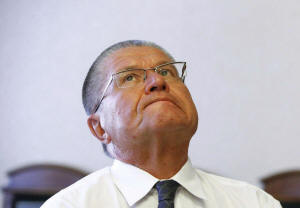|
Russian Economy Minister charged with
extorting $2 million bribe
 Send a link to a friend
Send a link to a friend
 [November 15, 2016]
By Svetlana Reiter and Vladimir Soldatkin [November 15, 2016]
By Svetlana Reiter and Vladimir Soldatkin
MOSCOW (Reuters) - Russian investigators on
Tuesday charged Economy Minister Alexei Ulyukayev with extorting a $2
million bribe from Rosneft, Russia's biggest oil company, in a case that
threatens to expose fault lines in President Vladimir Putin's inner
circle.
Ulyukayev, a 60-year-old technocrat whose ministry has been overseeing a
sale of state assets, is the highest-ranking Russian official to be
detained while in office since the collapse of the Soviet Union in 1991.
He faces up to 15 years in jail if found guilty.
The Investigative Committee, the state agency that investigates major
crimes, said Ulyukayev had extorted the bribe in exchange for approving
Rosneft's $5 billion purchase of a stake in mid-sized oil producer
Bashneft <BANE.MM>.
In a twist reminiscent of the Soviet era, his detention was announced in
the early hours of Tuesday morning, with state TV and pro-Kremlin
politicians presenting it as part of a high-profile fight against
corruption.
Others said it was evidence of infighting at the highest levels of
power, possibly involving Igor Sechin, the chief of Rosneft <ROSN.MM>, a
close Putin lieutenant who is one of Russia's most powerful men, and
might herald a shake-up.

Low oil prices and Western sanctions mean the government is struggling
to plug holes in the state budget ahead of a 2018 presidential election,
and that competition for resources inside the tightly-controlled system
has become more acute.
Law enforcement sources told Russian media the minister's phones had
been tapped and his electronic communications monitored. Investigators
set up a sting operation in which the alleged bribe was handed over on
Monday, the reports said.
Investigators said Ulyukayev had threatened to use his position to cause
problems for Rosneft unless it paid him.
They said they were not challenging the legality of Rosneft's purchase
of the Bashneft stake or investigating it.
Putin was informed about the case when the investigation was first
launched, Kremlin spokesman Dmitry Peskov told reporters. "These are
serious allegations," Peskov said. "Only a court can deliver a verdict."
Previous high-profile prosecutions during Putin's rule have been a cover
for settling commercial or political scores, according to people
involved in those cases. The Kremlin and law enforcement agencies deny
that, saying they only target criminals.
TURF WAR
Rosneft's acquisition of Bashneft last month was the focus of a major
turf war between rival Kremlin camps, sources close to the deal and in
the government have told Reuters.
Sechin lobbied hard for the green light to buy Bashneft, but the deal
was fiercely opposed by economic liberals in the government, some with
ties to Prime Minister Dmitry Medvedev, who believed Bashneft should go
to private investors.
Ulyukayev initially opposed Rosneft buying Bashneft, one of the most
lucrative state assets to be privatized in years, but eventually signed
off on the deal.
A 19.5 percent state-owned stake in Rosneft is up for privatization
next. Rosneft is poised to buy the stake itself to sell on to investors
later.
[to top of second column] |

Russian Economy Minister Alexei Ulyukayev speaks during an interview
with Reuters in Moscow, Russia, November 1, 2016. Picture taken
November 1, 2016. REUTERS/Sergei Karpukhin

Sources told Reuters last week that Rosneft's parent holding company may
help Rosneft with funds for the deal. One state company helping another
conduct a privatization is likely to be controversial among some members
of the government.
Christopher Granville, managing director at TS Lombard Research,
said Ulyukayev's detention might be linked to that.
"It must be because of what is happening next," Granville told
Reuters. "To prevent any obstructions to what influential people
want to happen next. Iím talking of course of the next phase of the
privatization of Rosneft."
He said there was a question mark over whether Rosneft buys the
stake in itself first to sell on or whether it is simply sold off to
investors without that intermediary step.
Alexander Shokhin, head of the Russian Union of Industrialists and
Entrepreneurs and briefly economy minister himself in the 1990s,
said he was skeptical about the accusations against Ulyukayev.
There had been a widespread consensus that the Bashneft stake had
been sold to Rosneft for a market price, so it was strange that a
bribe would be given for a valuation that everyone agreed on anyway,
he said.
In a country where bribes have sometimes totaled many tens of
millions of dollars, there was also surprise in some quarters at the
relatively small size of the alleged payment.
Medvedev and Putin spoke about the detention, Medvedev's office
said, adding: "The prime minister believes that the most painstaking
investigation of this case is required."
A Rosneft spokesman, Mikhail Leontyev, was quoted as saying by the
TASS news agency that the company saw no risk to the Bashneft deal.
"The deal is absolutely above board," he said.
The minister has been in his job since June 2013. He is not part of
Putin's inner circle, which is dominated by people who favor a
commanding role for the state in the economy, but neither is he a
part of the rival camp of economic liberals.

Ulyukayev is close to Andrei Kostin, the influential head of
Russia's second-biggest lender, state-owned VTB <VTBR.MM>, and
chairs VTB's supervisory board.
A Moscow court is due to rule later on Tuesday how long Ulyukayev
will be detained for.
(Additional reporting by Katya Golubkova, Maria Tsvetkova and
Alexander Winning; Writing by Christian Lowe/Andrew Osborn; Editing
by Richard Balmforth)
[© 2016 Thomson Reuters. All rights
reserved.]
Copyright 2016 Reuters. All rights reserved. This material may not be published,
broadcast, rewritten or redistributed. |